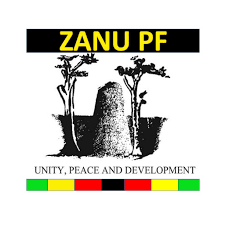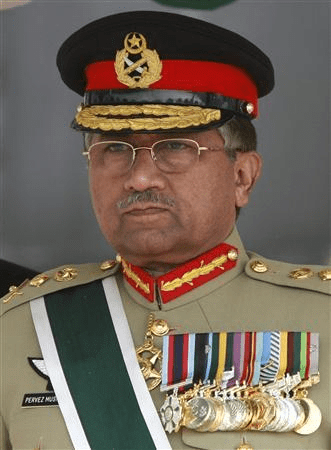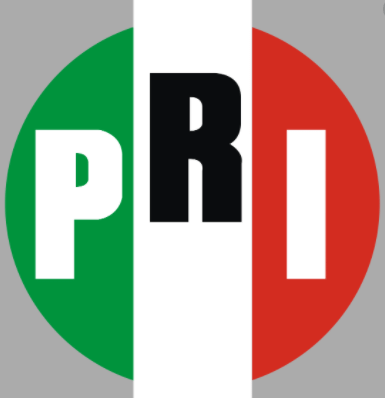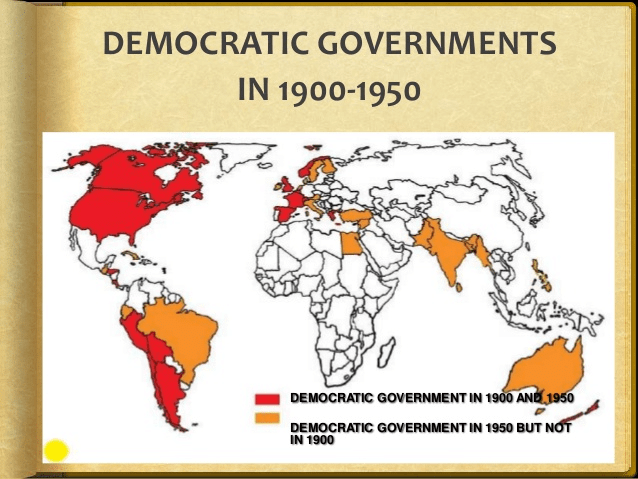Class 9 Civics Chapter 1 Extra Question Answers - What is Democracy?
Q1. Which party of Zimbabwe helped its country to gain independence?
The ZANU-PF party of Zimbabwe helped its country to gain independence.
Q2. Which Pakistani general led a military coup in October 1999?
The Pakistani general who led a military coup in October 1999 was General Pervez Musharraf.
General Parvez Musharraf
Q3. Since 1930, which country holds elections after every six years and which has never been under a military or dictator's rule?
The country is Mexico.
Q4. Zimbabwe attained independence from white minority rule in which year?
Zimbabwe attained independence from white minority rule in 1980.
Q5. During which period did China record its worst famines in world history?
China's famine of 1958-1961 was the worst recorded famine in world history. Nearly three crore people died in this famine.
Q6. Which one country out of France, the USA, Myanmar and India is not a truly democratic country?
Myanmar is not a truly democratic country because it is ruled by military rulers.
Q7. In Iraq, the real powers are held by which outside country?
The real powers in Iraq are held by the USA.
Q8. In which country does the vote of an indigenous citizen have more value than that of migrants from other countries?
In Fiji, the electoral system is such that the vote of an indigenous Fijian has more value than that of an Indian-Fijian (Fijian who is a descendent of migrants from India)
Q9. What are the major challenges to the working of democracy in India?
Casteism and communalism are the major challenges to the working of democracy in India.
Q10. Is it true of democracy that it allows a way of correcting its mistakes and offer more dignity to all citizens?
It is true because elections are held regularly in a democracy every few years, thus allowing a way of correcting our mistakes. It offers more dignity to all citizens by treating all of them equally.
Q11. Name the famous political party of Mexico.
The famous political party of Mexico is Institutional Revolutionary Party (PRI).
Q12. What is the most common form of democracy in today's world?
The most common form of democracy in today's world is representative democracy.
Q13. The government has not made any provision for drinking water in some villages in remote areas. The villagers of a particularly remote area decided to pay some money to the government officials to get water to their villages. Was this a democratic method?
No, this was not a democratic method. They could have organised public meetings against the government's policies, filed a case in the courts claiming that water is part of the right to life, or even boycotted the next elections to give a message to all parties, which are all democratic methods.
Q14. Where did democracy make its first formal appearance in the 5th and 6th century BC?
Democracy made its first formal appearance in the Greek city-states during the 5th and 6th century BC.
Q15. What are the three types of government practiced in Belgium?
The three types of government practiced in Belgium are:
(i) Central Government
(ii) State Government
(iii) Community Government
Q16. Which one country out of Bangladesh, USA, Saudi Arabia and India has the lowest participation of women in public life?
Saudi Arabia has the lowest participation of women in public life.
Q17. Name the capital of the Republic of Fiji.
Suva is the capital of the Republic of Fiji.
Q18. Which form of Government is present in Fiji?
Fiji is a Parliamentary republic run by a military-appointed government.
Q19. When did Estonia restore its independence from the Soviet Union?
Estonia, a state in the Baltic region in Northern Europe got independence from the Soviet Union on 20th August 1991.
Q20. Name the capital and official language of Estonia.
The capital of Estonia is Tallinn and the official language is Estonian. Other recognized regional languages are Voro, Setu.
Q21. Explain the type of government present in Mexico.
The United Mexican states are a federation whose government is representative, democratic and republican based on a presidential system according to the 1917 Constitution.
Q22. In which respect Saudi Arabia is the only country in the world?
Saudi Arabia is the only country in the world that ban women from driving.
Q23. Do the women of Saudi Arabia have the right to vote?
On 25th September 2011, Saudi Arabia's King Abdullah has announced that women will have the right to stand and vote in future local elections and join the advisory Shora, a council as full members.
Q24. What kind of government does Zimbabwe have?
Zimbabwe is a republic with a presidential system of government. But now the country is effectively an authoritarian dictatorship under President Robert Mugabe who has re-elected in 2013 at the age of 89 for another five years.
Q25. What was the designation taken by Pervez Musharraf for himself when he overthrew the democratic government of Pakistan in 1999?
Pervez Musharraf declared himself the Chief Executive of Pakistan when he overthrew the democratic government of Pakistan in 1999.
Q26. 'Banning Trade Unions'- Is it a characteristic of democracy or not?
'Banning Trade Unions' is not a characteristic of democracy. In a democracy, people can choose their own leaders.
Q27. Suggest one of the important features of democracy.
Democracy is a form of government in which rulers are elected by the people on the principle of one person, one vote.
Q28. With what motive did General Pervez Musharraf issue a 'Legal Framework order' in August 2002?
- In August 2002 he issued a legal framework order that amended the constitution of Pakistan. In this order, the President can dismiss the national and provincial assemblies.
- After passing, these law elections were held to the national and state assemblies.
- So the elections were held regularly and power rest with elected representatives.
- But still, the final power rests with military officers and Mushraff himself.
Q29. What does a candidate need before contesting elections in China?
A candidate needs the approval of the Chinese Communist Party before contesting elections in China.
Q30. Write three arguments in favour of democracy.
Arguments for democracy are:
- A democratic government is a more accountable form of government. A democracy requires that the rulers have to attend to the needs of the people.
- Democracy is based on negotiation and deliberation, which improves the quality of decision-making.
- It allows us to correct our own mistakes. In a democracy, there is always a scope that the rulers can change their wrong decisions, or the rulers themselves can be changed.
Q31. Is China a democratic country or not? Give two arguments in favour of your answer.
China is not a democratic country in the true spirit:
- For contesting the election to the Chinese Parliament, the candidates need the approval of the Chinese Communist Party. Only the members of the Communist Party and its eight allies are allowed to contest the election.
- There is one-party rule, i.e. the Communist Party in China, which is not the indication of a true democracy. Therefore, China cannot be said to be a true democracy.
Q32. Examine any three demerits of democracy.
Some demerits of democracy are:
- Leaders keep changing in a democracy. It leads to instability.
- Democracy is all about political competition and power play. Here political parties try to win elections spreading caste feelings, communalism, practising immoral methods etc.
- So many people have to be consulted in a democracy that it leads to delays. Involving people in the decision-making does lead to delay, which is not desirable for the nation.
Q33. Describe four features of democracy as a form of government.
The features of democracy are:
- Democracy is a form of government in which the rulers are elected by the people.
- Democracy must be based on a free and fair election, where those currently in power have a fair chance of losing.
- In a democracy, each adult citizen must have one vote and each vote must have one value.
- In a democracy, government rules within limits set by constitutional law and citizens rights.
Q34. Explain any three difficulties faced by the people in a non-democratic country.
Three difficulties faced by the people in a non-democratic country are:
- In a non-democratic country, all the people are at the mercy of the dictator or the military rulers. They may or may not respond to people's need.
- In non-democratic countries, people are not allowed to criticise the government. By doing this, people may face imprisonment, harassment, etc.
- In a non-democratic country, no opposition is tolerated, so the question of opposition party or trade unions does not arise.
Q35. How does democracy allow us to correct our own mistakes?
- There is no guarantee that mistakes cannot be made in a democracy. Actually, no form of government can guarantee it.
- The advantage of democracy is that mistakes cannot be hidden for a long time. There is always a scope for a public discussion of mistakes in democracy. In a democracy, all citizens can take part and there is room for correction.
- Either the rulers have to change their decisions, or the rulers themselves can be changed in democracy.
Q36. Write any three instances of denial or equal right to vote in world politics. Or Why are China, Estonia and Saudi Arabia not truly democratic countries? State one reason to each one of them. Or Why are China and Saudi Arabia non-democratic countries though they declared themselves as democracies? State one reason to each of the countries.
- One major demand of democracy is 'Universal adult franchise,' i.e., the right to vote for every adult citizen.
- But in world politics, there are many instances of denial of equal right to vote.
- In Saudi Arabia, women did not have the right to vote until 2011. On 25th September 2011, King Abdullah has declared that women will have the right to stand and vote in future.
- Estonia made its citizenship rule so that people belonging to the Russian minority find it difficult to get the right to vote.
- In China, before contesting the election, the needs approval of the Chinese Communist Party.
- Although the countries declare themselves as democracies, the fundamental principle of 'political equality ' is denied in all Cases. Thus, these are not truly democratic countries.
Q37. State the freedoms which are usually taken away when democracy is overthrown by a military regime.
The freedoms usually taken away by a military regime are:
- There will be no freedom of expression and speech.
- In a non-democratic government, the rulers do not have to act according to the wishes of the people. The needs of the people can be ignored by the military ruler.
- In a democracy, no one is a permanent loser or winner. But in a military regime, the same ruler or ruling party can rule the country for a very long time.
- In a non-democratic country, there is no freedom to form political associations and organize protests and political action. In reality, the political freedom of the citizen is completely denied in a military regime.
Q38. 'Democracy is all about political competition and powerplay. There is no scope for morality'. Justify the statement by giving arguments against democracy.
- Democracy as a form of government, only ensures that people can make their own decision.
- It does not guarantee that their decisions will be good always. In a democracy, leaders keep changing, which leads to instability.
- Democracy is based on consultation and discussion, but so many people have to be consulted in a democracy that it leads to a delay.
- Elected leaders do not know the best interest of the people. It leads to bad decisions.
- As democracy is all about political competitions, it leads to corruption. Political parties utilise many corrupt tricks to win the election.
- Ordinary people do not know what is good for them. People can make mistakes so they should not decide anything.
Q39. 'Democracy is better than any other form of government because it allows to correct its own mistakes. Justify the statement with the help of three examples. Or Democracy is better than other forms of government because it allows us to correct our own mistakes. Discuss.
- Democracy always offers scope for correction, which is impossible in any other form of government.
- No form of government is free from mistakes. Democracy also involves many mistakes. But the good thing is that it allows one to correct its own mistakes.
- The advantage of democracy is that, if there is any mistake, it cannot be hidden for long. Sooner or later, the public comes to know about them.
- There is always space for public discussion on these mistakes. And there is room for correction.
- Correction of mistakes results in either the rulers have to change their decision, or the rulers themselves can be changed through the election. This cannot happen in a non-democratic government.
Q40. Which of the following countries is not democratic?
(a) India
(b) China
(c) United States of America
(d) Nepal
(b) China
In China, the elections do not offer the people any serious choice. They have to choose the ruling party and the candidates approved by it. Hence, we cannot call China a democratic country.
|
53 videos|437 docs|80 tests
|
FAQs on Class 9 Civics Chapter 1 Extra Question Answers - What is Democracy?
| 1. What is democracy? |  |
| 2. Why is democracy important? |  |
| 3. What are the main features of democracy? |  |
| 4. What are the different types of democracy? |  |
| 5. What are the advantages and disadvantages of democracy? |  |

|
Explore Courses for Class 9 exam
|

|






















